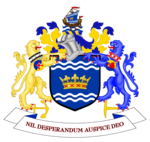Sunderland Town Council
| Sunderland | ||
|---|---|---|
| City and metropolitan borough | ||
|
||
 Location of Sunderland in England |
||
| Sovereign state | United Kingdom | |
| Country | England | |
| Region | North East | |
| County | Tyne and Wear | |
| Historic county | County Durham | |
| Established | 1 April 1973 | |
| Admin HQ | Sunderland city centre | |
| Government | ||
| • Type | Leader and Cabinet | |
| • MPs |
Bridget Phillipson (Lab) Sharon Hodgson (Lab) Julie Elliott (Lab) |
|
| Area | ||
| • Land | 53 sq mi (137 km2) | |
| Population (2011) | ||
| • Total | 275,300 | |
| • Density | 5,190/sq mi (2,003/km2) | |
| Time zone | Greenwich Mean Time (UTC+0) | |
| • Summer (DST) | British Summer Time (UTC+1) | |
| Website | http://www.sunderland.gov.uk/ | |
The City of Sunderland (/ˈsʌndərlənd/) is a local government district of Tyne and Wear, in North East England, with the status of a city and metropolitan borough. It is named after its largest settlement, Sunderland, but covers a far larger area which includes the towns of Hetton-le-Hole, Houghton-le-Spring, Washington, and a range of suburban villages.
The district was formed in 1974, titled the Metropolitan Borough of Sunderland, as part of the provisions of the Local Government Act 1972 and is an amalgamation of four former local government districts of County Durham. It was granted city status in 1992, the 40th anniversary of the Queen Elizabeth II's accession. The city had a population of 275,300 at the time of the 2011 census, with the majority of the population (174,286) residing in Sunderland. The 'Sunderland Built-up Area' (including Whitburn in South Tyneside and Chester-le-Street, Ouston, South Hetton and Pelton in County Durham) is quoted alternatively as having a population of around 335,000.
...
Wikipedia

